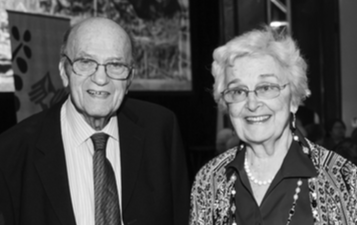The Unitarian Universalist Service Committee advances human rights through grassroots collaborations.
Stories of Hope 2015: Catherine Chvany and Alexander Strasser

This story of Catherine Chvany and Alexander Strasser is presented as part of UUSC’s Guest at Your Table program.
We see them sometimes, trapped in grainy, black and white lm documentaries. They were the most poignant of victims — young children caught in the maelstrom sweeping across Europe in the early days of World War II. Even today we wish, impossibly, that we could save them from their hopeless fate.
At UUSC’s 75th Anniversary Gala in April, we were honored to be joined by some of the children who were saved: Catherine Chvany and Alexander Strasser. They are living testimonials to UUSC’s founding mission and the enduring values that carried Rev. Waitstill and Martha Sharp to Europe 75 years ago.
Even before reaching the United States, the story of Alex and his family featured a near-miraculous escape. His father,
a prominent physician in Vienna, was interned at two concentration camps — Dachau and then Buchenwald — and freed only after Alex’s mother sold some of her jewelry to bribe a guard at Buchenwald.
The family escaped to France, where they were interned by the Vichy government. Their future looked even darker when cancer took the life of Alex’s mother.
But then their fortunes shifted: Alex’s father met Martha Sharp. Working in unoccupied France, Martha was nally nearing success on two extraordinarily dif cult tasks: getting the Vichy government to issue exit visas for 29 children — and convincing the U.S. State Department, riddled with anti-Semitism, to let the children into this country.
Alex’s father arranged with Martha to include six-year-old Alex and his older brother Joe among that fortunate group. And in December 1940 they joined hundreds of other refugees in setting sail from Lisbon on a ship that had been stripped of almost all furnishings so it could pack as many passengers as possible. Today, Alex has little memory of the crossing — except, he adds with a laugh, that fellow passengers labeled him and as his brother “the two tigers.”
That ship also carried to safety 13-year-old Catherine Vakar (now Chvany) and her younger sister, Anna. The two girls had
been born in Paris to émigré Russians but were spending the early months of the war in the Pau region of the French Pyrenees. That’s where Martha Sharp was arranging for shipments of desperately needed milk for thousands of hungry children — in fact, it had been the repeated pleas of parents in Pau that first motivated Martha to find a way to help children escape the continent.
Cathy and Anna were late additions to the emigrating group. Their father had met Martha Sharp’s secretary, a fellow Russian national, just a few days before departure and pleaded with her to take his daughters — a request made possible only later by the late withdrawal of two other passengers.
After reaching the United States, Cathy stayed in touch with the Sharps, babysitting the couple’s young son and establishing a lifelong friendship with their daughter. And she has never forgotten her good fortune in escaping Europe during those dark days. “What I owe Martha is my life in America. Perhaps my life itself.”
If hope is a promise to the future, Catherine Chvany and Alexander Strasser devoted the rest of their lives to making the most of that promise. Catherine studied at Harvard, married, raised a family, and became a distinguished professor of Russian at the Massachusetts Institute of Technology. Alexander earned his medical degree, married, and raised his family in Rochester, N.Y., where he still practices medicine.
Go deeper and take action: